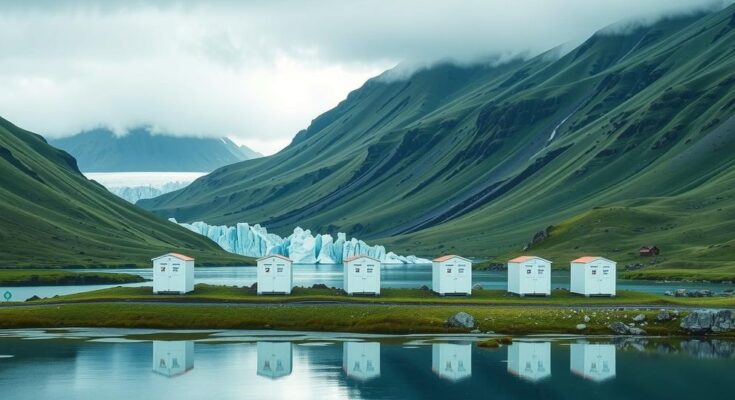Greenland’s parliamentary election attracted global attention due to President Trump’s pledge to acquire the mineral-rich island. High turnout was noted, with a majority supporting independence but divided on timing. The potential impact of U.S. involvement and historical grievances with Denmark has intensified independence discussions among residents.
Polling concluded on Tuesday in Greenland’s parliamentary election, which garnered international attention due to U.S. President Donald Trump’s pledge to assert control over the mineral-abundant island. The election saw a high voter turnout among the 40,500 eligible citizens at 72 polling stations, with voting extended by half an hour past the initial closing time. The official vote count is anticipated to take three to five hours to complete, as no exit polls were available.
Since assuming office, President Trump has expressed intentions for Greenland, a semiautonomous territory of Denmark, to become part of the United States by emphasizing its importance to U.S. security. The island, home to 57,000 residents, has found itself in a strategic competition in the Arctic region, where diminishing ice has enabled access to resources and new shipping routes, intensifying military activities from Russia and China.
Greenland was a Danish colony until 1953 and began gaining autonomy with the establishment of its parliament in 1979. Although it won the right to claim full independence in a 2009 referendum, concerns about economic stability and support from Denmark have led to a hesitation to do so. Candidate Qupanuk Olsen of the pro-independence Naleraq party articulated, “I strongly believe that we will very soon start to live a life more based on who we are, based on our culture.”
In contrast, Inge Olsvig Brandt, a candidate from the ruling Inuit Ataqatigiit Party, stated, “We do not need the independence right now. We have too many things to work on.” The impact of Trump’s interest has shifted the focus toward independence discussions, fueled by a resurgence of pride in Inuit culture. Concerns were raised, as leaders expressed distrust in Trump during a recent debate ahead of the elections.
Though a January poll suggested a majority support independence, there exists a division on its timing. Julie Rademacher, a former advisor to the Greenland government, observed that while anger towards Denmark persists, apprehensions regarding American imperialism are growing. Interviews with residents in Nuuk indicated a general favor for independence, but many were wary of the economic repercussions of a swift change.
Greenland possesses significant natural resources, including vital minerals, yet the process of extraction is slow due to environmental issues and the dominance of Chinese control over the sector. Furthermore, Trump’s earlier remarks on military intervention alarmed Greenland citizens; however, he later shifted to a more conciliatory approach, showing readiness to support the local population financially if they agreed to join the U.S.
Greenland’s Prime Minister Mute Egede asserted that the island is not for sale and emphasized the need for a united local front against external pressures. In a recent interview, he rejected Trump’s offers as disrespectful, advocating instead for collaboration with other countries. Meanwhile, Denmark’s Prime Minister reaffirmed that the future of Greenland lies in the hands of its people.
The pro-independence Naleraq Party has gained traction in the lead-up to the election, leveraging U.S. interest and highlighting historical grievances against Denmark regarding Greenland’s resources. The party seeks to strengthen Greenland’s negotiating position with Denmark regarding independence, aiming to bring a proposal for a public vote before the next parliamentary election in four years.
In summary, the Greenland election has spotlighted critical discussions regarding the island’s potential independence, spurred by U.S. interest and a growing affirmation of Indigenous culture. Despite a desire for self-determination among many Greenlanders, economic concerns and historical ties to Denmark remain influential. With significant mineral resources at stake, the future political landscape will likely continue to evolve under local and international pressures.
Original Source: www.voanews.com




